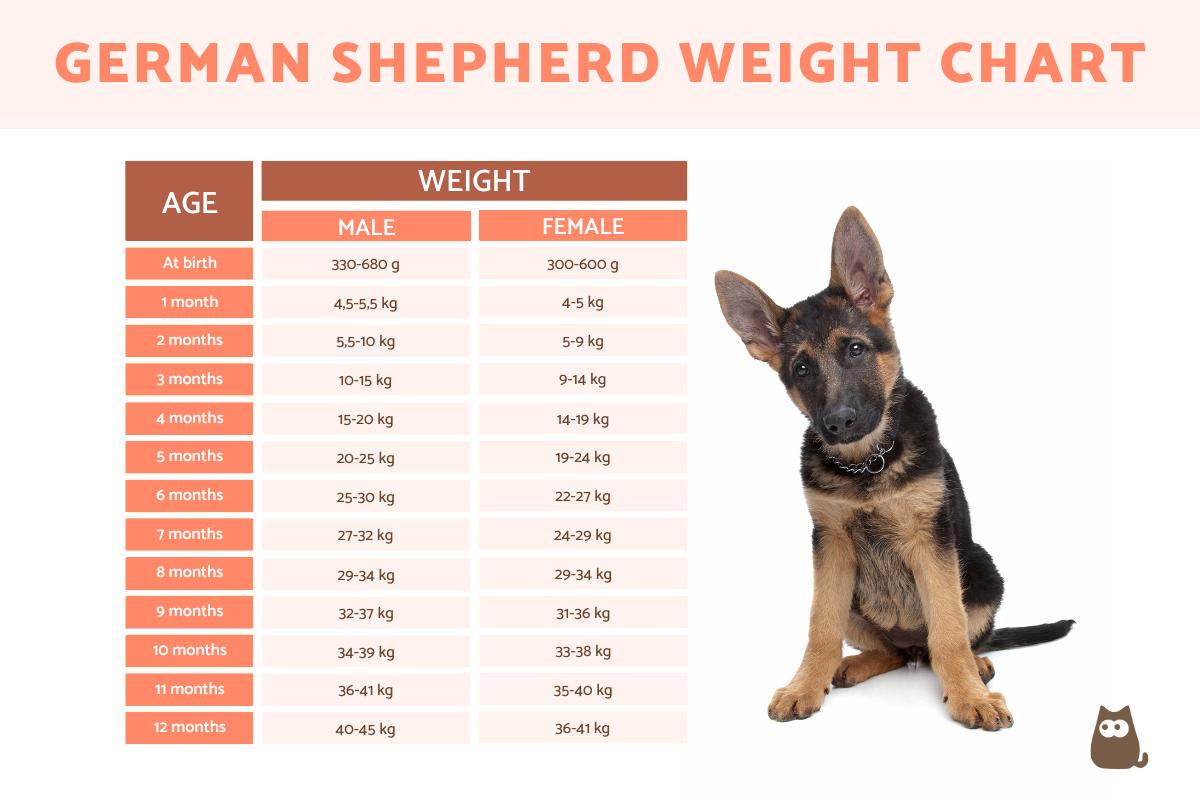How Much Do German Shepherds Weigh?


Animal file: German Shepherd
A dog's weight is an important consideration when adopting an animal. In terms of practical space, not all homes will be equipped to house a very large dog. We also need to be able to walk them comfortably and ensure the safety of all members of the home, including the dog themselves. If we adopt a German Shepherd puppy, their size as an adult when they have finished development can shock us. While there will be some variation among individuals, German Shepherd dogs are considered a large-sized dog breed.
At AnimalWised, we find out just how large is a GSD by asking how much do German Shepherds Weigh? In addition to looking at the optimal weight for this breed, we provide a German Shepherd growth chart to help determine what size they might be as they age.
How much does a German Shepherd puppy weigh?
As stated in the introduction, the German Shepherd is considered a large dog breed. While there are some even larger breeds, such as the Great Dane, the German Shepherd looms much larger than most other dogs. This means they will be a considerable weight, even when they are newborn.
There is a slight difference in size between male and female German Shepherd, with males usually being slightly larger and heavier. This means we need to take sex into consideration when creating a German Shepherd weight chart. Larger dogs often take longer to develop than smaller breeds, although there may be some variation. For this reason, we need to consider each stage of their development.
Not all German Shepherd puppies will grow at the same rate. There are many other factors such as diet, health and the level of care they receive, among others. As a larger dog, it will take around 18-24 months for them to reach maturity. However, it may require as much as 3 years for a German Shepherd to reach their full adult size and intelligence. Females also tend to mature a little more quickly than males, but this too will depend on the individual.
With all the above variables taken into consideration, we can provide a German Shepherd puppy weight chart to help provide an idea of their weight and size as they develop into adulthood:

How much does an adult German Shepherd weigh?
From the age of 12 months onwards, the German Shepherd's weight is consolidated and will more or less maintained for the remainder of their life. It is possible that it increases slightly and exceeds the standardized figures. These adult German Shepherd weight ranges are the following:
- Male GSD: 66–88 lb (30-40 kg)
- Female GSD: 49–71 lb (22-32 kg)
Although these are the general breed standard weights provided by the International Canine Federation (FCI), there are individuals who can grow even larger. This may be as much as 77 lb (35 kg) in females and 99 lb (45 kg) in males. These are included in the weight range for healthy German Shepherds. There are individuals who may weigh more, but they will be considered overweight.
Despite exceeding the FCI breed standard weights, this means it is possible a dog is GSD is heavier, but still considered healthy. If we wonder whether our dog is overweight or obese, we can look at the World Small Animal Veterinary Association (WSAVA) guide on parameters for healthy weights in dogs:
- Underweight: the dog has no perceptible body fat or muscle mass and very marked bone structures which can be seen through the skin (especially the ribs and spine).
- Ideal weight: dogs which have are of an ideal weight have palpable ribs, but with minimal fat coverage. They also have an observable waist.
- Overweight: dog has ribs with excess fat coverage, no prominent waist or no waist at all. They will also have visible fat deposits on various parts of their bodies.
You can use the dog weight chart guide below to get an idea as to whether your dog is overweight. Despite varying morphologies, this chart works for all dogs, including the German Shepherd.
If you are at all unsure of whether your German Shepherd is at a healthy weight, you should go to a veterinarian. After they are born, you will need to take the GSD puppy to the veterinarian for assessment and the establishment of vaccination and deworming schedules. Regular checkups throughout their lives should be carried out which will check their weight in a clinical setting.
Providing a balanced diet, sufficient exercise and the right level of care will help to ensure your German Shepherd does not gain too much weight. Being careful with treats and not feeding them human food are other factors. Veterinary checkups are especially important for this breed as they will help to monitor for diseases common to the German Shepherd such as hip dysplasia.
For dogs that are determined to be overweight, you will need to discuss a diet plan with the veterinarian. Take a look at our homemade dog food recipes for overweight dogs to learn more.

How much does an elderly German Shepherd weigh?
Elderly dogs experience a retardation in metabolism. This is largely because they do not assimilate nutrients in the same way as younger dogs, losing muscle mass and even mobility in the process. All of this causes some specimens to lose or gain weight, making it difficult to their ideal weight. In this final stage of their lives it is advisable to guarantee them a good diet and follow the veterinarian's guidelines regarding their physical activity routine.
The German Shepherd breed has a greater predisposition to suffer from hip dysplasia during adulthood or old age. It is important to attend regular veterinary check-ups to detect it as soon as possible if it develops. Now that you know how much a German Shepherd weighs at different stages, ensure you provide them with the diet and exercise they need to maintain a healthy weight throughout their lives.
Learn about the different types of German Shepherd dogs with our related article.
If you want to read similar articles to How Much Do German Shepherds Weigh?, we recommend you visit our Basic care category.







